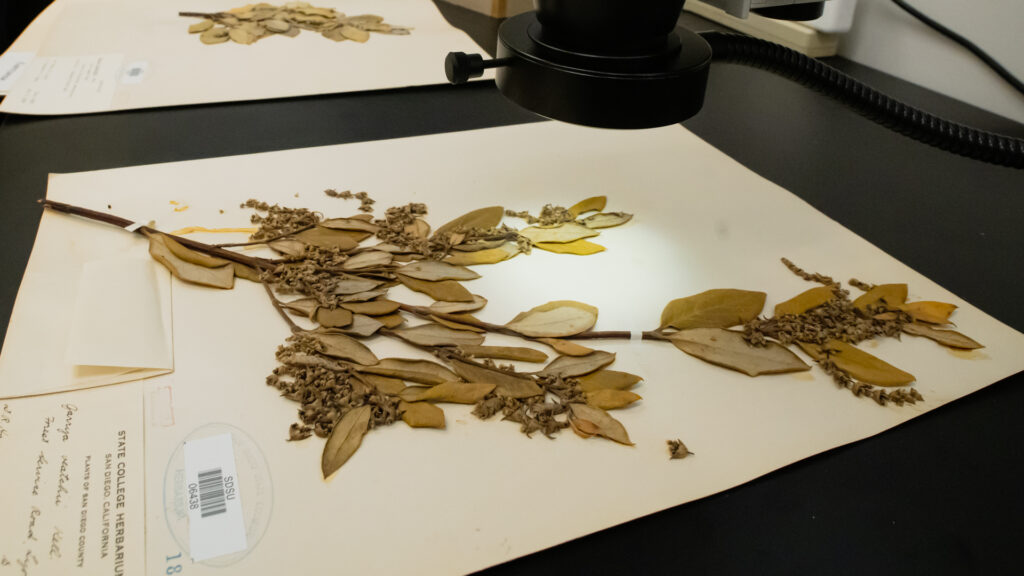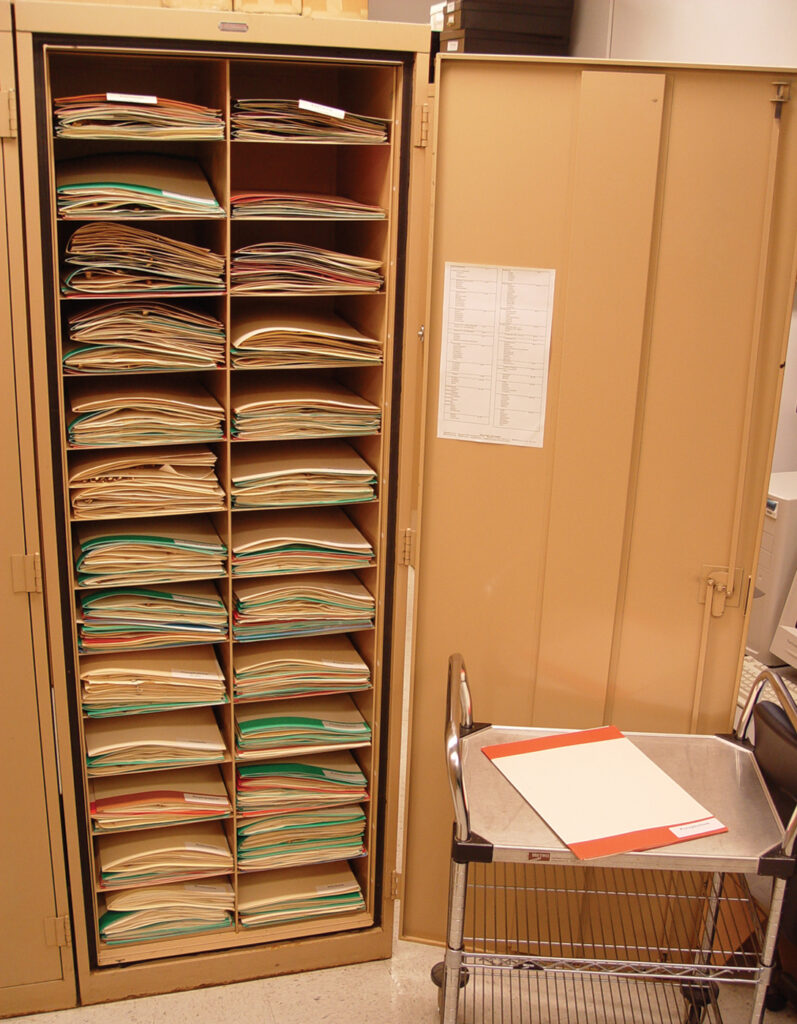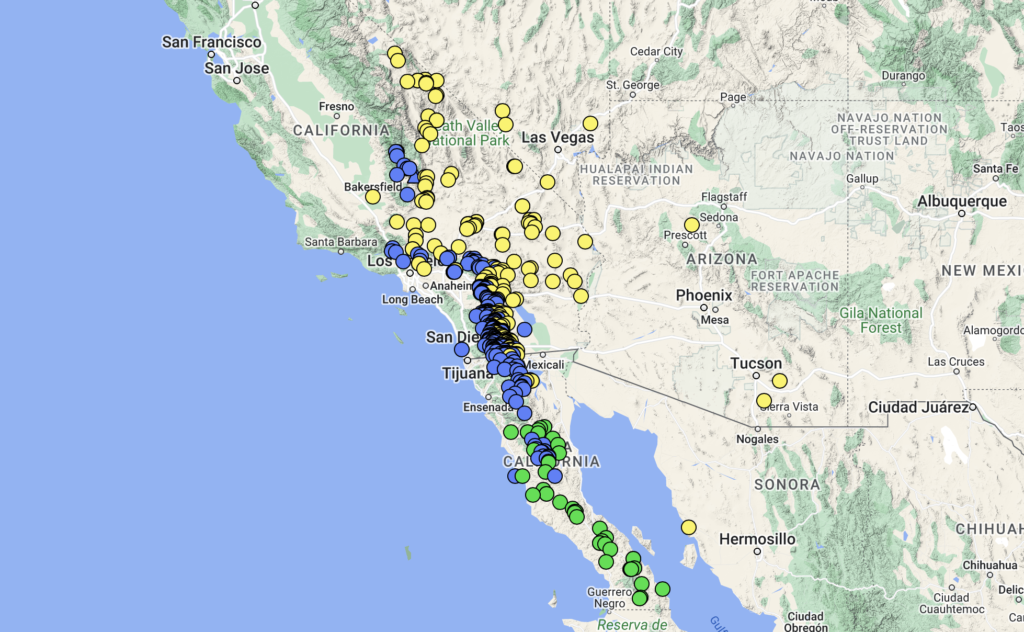The SDSU Biodiversity Museum Plants, Algae, and Lichen Collections include the SDSU Herbarium, Mediterranean Garden, and Greenhouse. Specimens in the collections are used for scientific studies and as voucher documentation for numerous theses and research projects. These specimens are also used as exemplars in several Biology courses, including Biology of the Algae, Field Botany of San Diego County, Plant Systematics, and Principles of Organismal Biology.
The SDSU Herbarium has approximately 27,000 specimens of vascular plants, ca. 500 specimens of algae, and a growing collection of bryophytes and lichens. All specimens are databased, with >99% imaged, all data and images accessible online. The vascular plant collections of the SDSU Herbarium are databased at Consortium of California Herbaria 2 (CCH2), with a “snapshot” uploaded to SEINet. The SDSU algae, bryophyte, and lichen collections are databased at the Algae Herbarium Portal, the Consortium of Bryophyte Herbaria, and the Consortium of Lichen Herbaria, with “snapshots” uploaded to the CCH2. To date, 41 publications from SDSU personnel in peer-reviewed journals cite specimens housed in the SDSU Herbarium (see below). Worldwide, more than 730 citations of SDSU Herbarium records (as of Mar 2025) are tabulated in the Global Biodiversity Information Facility (GBIF).
Please contact Dr. Michael Simpson or Dr. Lluvia Flores-Rentería if you are interested in these collections: either using them as resources, doing a research project, or volunteering to help out.
Announcements and Events
- Cuyamaca College Horticulture Class visits SDSU Greenhouse and Herbarium
- Talk on Plant Dispersal between the American Continents
- SDSU Herbarium Receives California Institute of Biodiversity Grant to Process Swinney Specimens



In-House Publications Citing SDSU Herbarium Specimens
(bold=SDSU; *=graduate student; **=undergraduate student)
2024
- Simpson, M.G. & York, D.A. 2024. Cryptantha whippleae, a new serpentine adapted species endemic to northern California, U.S.A. Phytokeys 247: 155–172. https://doi.org/10.3897/phytokeys.247.132060.
- Simpson, M. G., L. M. Simpson, and J. André. 2024. Cryptantha acrimuricata (Boraginaceae), a distinctive new taxon of series Muricatae. Phytokeys 250: 193–213. https://doi.org/10.3897/phytokeys.250.138635
2023
- Simpson, M. G. and L. Gross. 2023. Noteworthy Collection: Cryptantha crassisepala (Torrey & A.Gray) Greene var. elachantha I.M.Johnston. Madroño 70:4–8.
2022
- Simpson, M. G., R. Vanderhoff, J. Bailey, F. Roberts, M. Mulligan, J. P. Rebman, N. Walsh, and M. Koekemoer. 2022. Taxonomic identity of a recently naturalized Senecio species in California. Madroño 69:286–298.
- Moroni, P. and M. G. Simpson. 2022. Revisión taxonómica del genero Johnstonella (Boraginaceae s. str.) en la Argentina. Darwiniana Nueva Serie 10:260–270.
- Rebman, J. P. and M. G. Simpson. 2022. Three new species of Cryptantha (Boraginaceae) from the Southern Channel Islands of California. Madroño 69: 111-134.
- Simpson, M. G., K. Hasenstab-Lehman, M. Mabry, and M. Muñoz. 2022. Johnstonella punensis (Boraginaceae), a new species endemic to the dry Puna of Chile. PhytoKeys 197:149–164.
2021
- Simpson, M. G. and J. P. Rebman. 2021. A new species of Cryptantha restricted to dunes in northwestern Baja California, Mexico. Madroño 68:127-137.
- Simpson, M. G. and J. P. Rebman. 2021. Research in Boraginaceae: A new variety of Cryptantha maritima, Cryptantha pondiiresurrected, and Johnstonella echinosepala transferred back to Cryptantha. Phytotaxa 509:185–210.
- Yost, J. M., K. D. Pearson, J. Alexander, E. Gilbert, L. A. Hains, T. Barry, R. Bencie, P. Bowler, B. Carter, R. E. Crowe, E. Dean, J. Der, A. Fisher, K. Fisher, L. Flores-Renteria, C. M. Guilliams, C. Hatfield, L. Hendrickson, T. Huggins, L. Janeway, C. Lay, A. Litt, S. Markos, S. J. Mazer, D. Mccamish, L. Mcdade, M. Mesler, B. Mishler, M. Nazaire, J. Rebman, L. Rosengreen, P. W. Rundel, D. Potter, A. Sanders, K. C. Seltmann, M. G. Simpson, G. A. Wahlert, K. Waselkov, K. Williams, and P. S. Wilson. 2020. The California Phenology Collections Network: Using digital images to investigate phenological change in a biodiversity hotspot. Madroño 66:130-141.
2020
- Simpson, M. G. and R. B. Kelley. 2020. Cryptantha. Pp. 394-403 in T. J. Stephen C. Meyers, Katie E. Mitchell, Tanya Harvey Linda K. Hardison (ed.), Flora of Oregon. Volume 2: Dicots A-F. Brit Press, Botanical Research Institute of Texas, Fort Worth, Texas.
- Simpson, M. G., J. Stephens, and S. Yang. 2020. Noteworthy Collections: Johnstonella angelica (I.M.Johnston) Hasenstab & M.G.Simpson. Madroño 67:5-8.
2019
- Benet-Pierce, N. and M. G. Simpson. 2019. The taxonomy of Chenopodium hians, C. incognitum, and ten new taxa within the narrow-leaved Chenopodium group in western North America, with special attention to California. Madroño 66:56–75.
- Simpson, M. G., M. E. Mabry, and K. Hasenstab-Lehman. 2019. Transfer of four species of Cryptantha to the genus Johnstonella (Boraginaceae). Phytotaxa 425:279–289.
2018
- Mabry, M. E.* and M. G. Simpson. 2018. Evaluating the monophyly and biogeography of Cryptantha (Boraginaceae). Systematic Botany 43: 53-76.
2017
- Aerne-Hains, L.* and M. G. Simpson. 2017. Vegetative anatomy of the Haemodoraceae and its phylogenetic significance. International Journal of Plant Sciences 178: 117-156.
- Benet-Pierce, N. and M. G. Simpson. 2017. Taxonomic recovery of the species in the Chenopodium neomexicanum complex and description of Chenopodium sonorense sp. nov. Journal of the Torrey Botanical Society 144: 339-356.
- Guilliams, M. C., K. Hasenstab-Lehman, M. Mabry* and M. G. Simpson. 2017. Memoirs of a frequent flier: Phylogenomics reveals 18 long-distance dispersals between North America and South America in the popcorn flowers (Amsinckiinae, Boraginaceae). American Journal of Botany 104: 1717-1728.
- Simpson, M. G., C. M. Guilliams, K. E. Hasenstab-Lehman, M. E. Mabry*, and L. Ripma*. 2017. Phylogeny of the popcorn flowers: Use of genome skimming to evaluate monophyly and interrelationships in subtribe Amsinckiinae (Boraginaceae). Taxon 66: 1406–1420.
- Simpson, M. G. and R. B. Kelley. 2017. Cryptantha nevadensis var. rigida elevated to species with a new name, C. juniperensis. Phytotaxa 295: 227-236.
2016
- Mabry, M. E.*, R. A. Dowdy**, L. M. Simpson, J. P. Rebman, and M. G. Simpson. 2016. Taxonomy of the winged popcorn flower: Cryptantha pterocarya (Boraginaceae). Phytotaxa 253:97-130.
- McCabe, S. W., M. W. Dodero, and M. G. Simpson. 2016. Dudleya hendrixii: A new, rare species From Colonet Mesa, Baja California. Madroño 63: 359-365.
- Simpson, M. G., L. M. Simpson, and J. P. Rebman. 2016. A new, large-flowered variety of Eremocarya micrantha (Boraginaceae). Madroño 63: 39-54.
2014
- Benet-Pierce, N. and M. G. Simpson. 2014. The taxonomy of Chenopodium desiccatum and C. nitens, sp. nov. Journal of the Torrey Botanical Society 141:161-172.
- Rebman, J. P. and M. G. Simpson. 2014. Checklist of the Vascular Plants of San Diego County, 5th edition. San Diego Natural History Museum Publications.
- Ripma, L.*, M. G. Simpson, and K. Hasenstab-Lehman. 2014. Geneious! Simplified genome skimming methods for phylogenetic systematic studies: A case study in Oreocarya (Boraginaceae). Applications in Plant Sciences 2: 1400062
- Simpson, M. G., R. Dowdy**, J. P. Rebman, R. B. Kelley, and L. M. Simpson. 2014. The recognition of two species in Eremocarya (Boraginaceae): Evidence from fornix bodies, nutlets, corolla size, and biogeography. Madroño 61: 259–275.
2013
- Guilliams, C. M., B. A. Veno, M. G. Simpson, and R. B. Kelley. 2013. Pectocarya anisocarpa, a new species of Boraginaceae, and a revised key for the genus in western North America. Aliso 31: 1-13.
- Silveira, M.* and Simpson, M. G. 2013. Phylogenetic systematics of the mesa mints: Pogogyne (Lamiaceae). Systematic Botany 38: 792-794.
- Simpson, M. G., J. P. Rebman, K. E. Hasenstab-Lehman, C. M. Guilliams, and P. McConnell. 2013. Cryptantha wigginsii (Boraginaceae): A presumed extinct species rediscovered. Madroño 60(1): 24-34.
- Simpson, M. G. and J. P. Rebman. 2013. A new species of Cryptantha (Boraginaceae) from the Sierra de San Pedro Mártir, Baja California, Mexico. Madroño 60(1): 35-45.
- Yost, J. M., M. Bontrager, S. McCabe, D. Burton*, M. G. Simpson, K. M. Kay, and M. Ritter. 2013. Phylogenetic relationships and evolution in Dudleya (Crassulaceae). Systematic Botany 38: 1096-1104.
2012
- Dodero, M. W.* and M. G. Simpson. 2012. Dudleya crassifolia (Crassulaceae), a new species from northern Baja California, Mexico. Madroño 59: 223-229.
- Hasenstab-Lehman, K. E.* and M. G. Simpson. 2012. Cat’s Eyes and Popcorn Flowers: Phylogenetic Systematics of the Genus Cryptantha s.l. (Boraginaceae). Systematic Botany 37: 738–757.
2011
- Guilliams, C. M.*, Simpson, M. G., and J. P. Rebman. 2011. Calyptridium parryi var. martirense (Montiaceae), a new taxon endemic to the Sierra San Pedro Mártir, Baja California, Mexico. Madroño 58(4): 258-266.
2010
- Benet-Pierce, N. and M. G. Simpson. 2010. Chenopodium littoreum (Chenopodiaceae): a new goosefoot from dunes of south-central coastal California. Madroño 57: 64–72.
- Simpson, M. G., M. Silveira*, and C. M. Guilliams*. 2010. Taxonomy of Calyptridium parryi (Montiaceae). Madroño 57: 154-160.
2009
- Simpson, M. G. and K. E. Hasenstab*. 2009. Cryptantha of Southern California. Crossosoma 35: 1-59.
- Pierce, N. and M. G. Simpson. 2009. Polyaperturate pollen types and ratios of heteromorphism in the monocot genus Conostylis R. Br. (Haemodoraceae). Australian Systematic Botany 22: 16-30.
2003
- Hargrove, L. and M. G. Simpson. 2003. Ultrastructure of heterocolpate pollen in Cryptantha (Boraginaceae). International Journal of Plant Sciences 164(1): 137-151.
1999
- Marsden, K. L.* and M. G. Simpson. 1999. Eryngium pendletonensis (Apiaceae), a new species from southern California. Madroño 46(1): 55-58.

